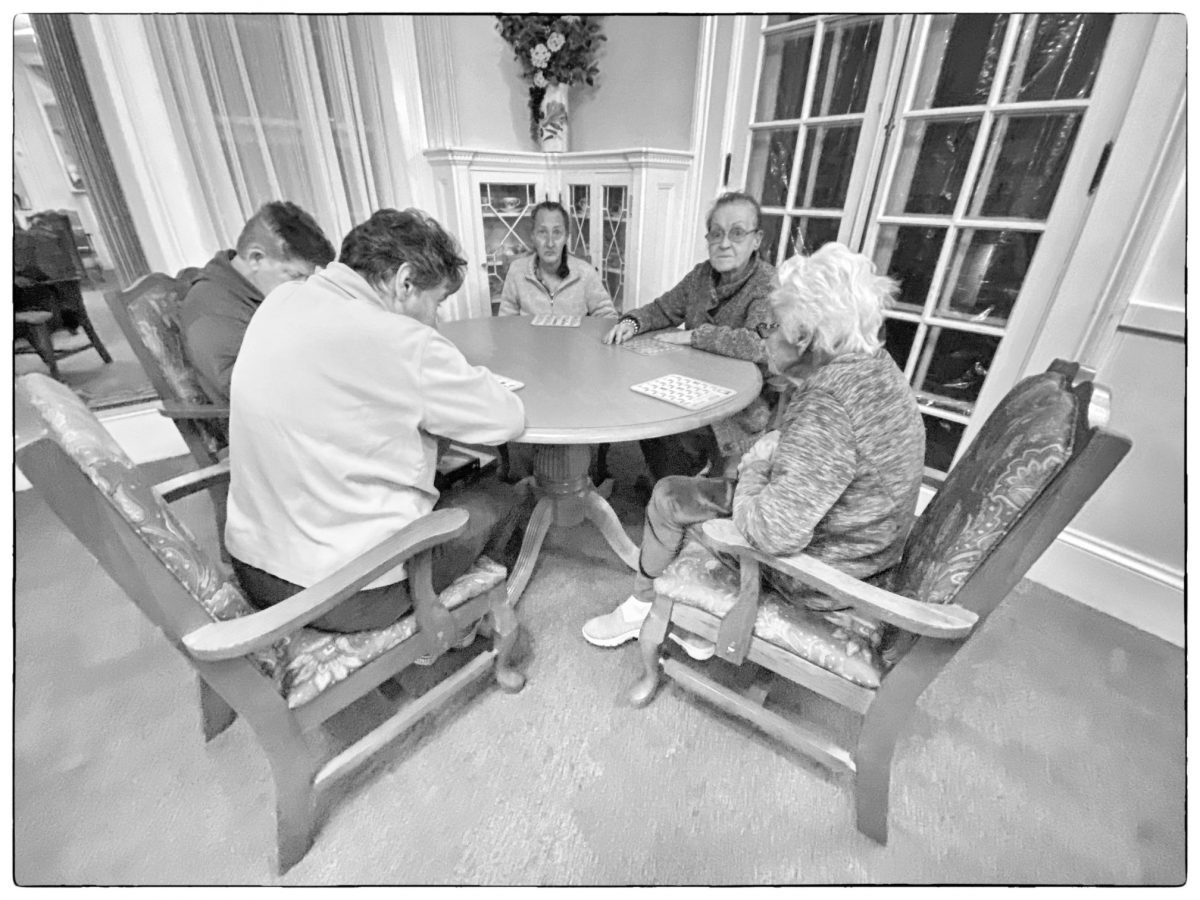Maria and I have been calling the Friday night Bingo games at the Mansion for almost two years now; tonight, we were greeted by a rousing welcome, cheers, and applause for the first time.
These games mean a lot to the residents and me, as well.
Every time I see them, they ask me if we’re going to show up. When I have the money, I go and buy some inexpensive prizes – stuffed animals, jewelry, books, puzzles, reading lights.
The Mansion also has a prize cart, where small gifts like playing cards or beads or little presents are stored.
It’s almost a stereotype, Bingo and the elderly, I think of Bingo as the National Sport of Assisted Care. When Maria is calling (we take turns), I like to watch the residents and try to figure out why Bingo means so much to them.
Some of it I can see. Bingo is a socializing game, one of the few times in a week where the residents gather together for play that not structured or supervised. Sometimes they sit with their friends, sometimes they mix. I sense the residents are often lonely, even in a crowd of people. They want and need to socialize with one another at times.
Bingo is a safe and accessible way to do that.
I noticed the residents take care of one another, helping each other to spot numbers that are called, even reading out the numbers for others when they have a Bingo.
In the context of assisted care, Bingo is stimulating. It is said to increase mental flexibility, alertness, and concentration. At a time of life characterized by loss, there some chances to win.
It’s an inclusive game; everyone is invited, I see all kinds of people there I typically rarely see, people who stay in their rooms or read off in a corner by themselves, people with sharp memories and people with little mind.
It is part of human nature to be competitive, and there is mostly a healthy competition, something rare for the elderly. There is also the element of luck and suspense. Some of the people win every time; some win once or twice in months. I see that the desire to win is intense.
Then there are the prizes. There is a winner in every game. People of all ages like prizes, they like to win and have something to show for it.
I handed out a sackful of classy old jewelry someone sent me for the residents; they loved putting the bracelets on their wrists and the pins on their blouses.
The shrinks say Bingo promotes socialization, gets people together and thinking and laughing and out of their rooms. It is believed to increase mental flexibility and alertness and also exercise hand-eye coordination.
I sense there is a lot of healing the Bingo games, and also a lot of laughter. I hear a lot of jokes and kidding; I see them making connections with one another.
People seem genuinely happy when somebody wins a game; there is loud and enthusiastic applause. People help people with hearing or sight problems; they watch their cards and let them know when they have a number that has been called.
Sometimes, the desire to win is too much. There has been some cheating, and we deal with those privately after the game is over. I only had to ask one resident to leave, he was memorizing the called numbers and pretending to have them.
I don’t look the other way about cheating, that would be patronizing and demoralizing to the other players.
At the end of the Bingo game, everyone comes up to thank Maria and me; they gather around to study our prizes or those in the prize cart.
They line up me to tell me what they need: Georgianna and Nancy need jeans, Peggie needs a winter jacket, somebody else needs a sweater, everybody needs warm socks, Sylvie wants to know if I read her last letter and what to make of it.
Somehow, Sylvie knows that Fate was injured; she asks me to give Fate her live. Sylvie doesn’t like to touch dogs because they remind her of the dog who disappeared during her life in Austria after World War II.
But she loves dogs. “Please give her my love,” she said, “I feel that will matter to her.” So we did.
(I just bought some “Bishop Maginn Mural Mob” hats for the BM mural makers. If you wish to support my work at the Mansion and with refugee children, you can contribute via Paypal, [email protected] or by check, Jon Katz, Mansion/Refugee Fund, P.O. Box 205, Cambridge, N.Y., 12816.)


That SYLVIE !!!!